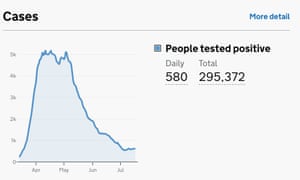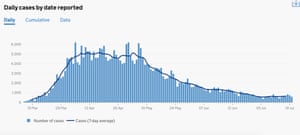
In the Commons Hancock tells MPs that he wants every person in the NHS to get a flu vaccine this winter, unless there is a very good reason why they should not have to have one.
My colleague Peter Walker points out that, in his lengthy reply to Jonathan Ashworth, Matt Hancock forgot to address Ashworth’s very first question. (See 4.52pm.)
Peter Walker
(@peterwalker99)In the Commons, Matt Hancock has answered every one of a long list of questions on coronavirus from Labour’s Jon Ashworth…. apart from why chief nurse Ruth May was dropped from a No 10 briefing for not being 100% onside with the Cummings mantra. Odd he should forget that.
Hancock say the long-term effects of coronavirus can be very debilitating for a minority of patients. Without naming them, he says at least one MP is in this category.
Hancock says the advice telling people to shield is being withdrawn at the end of this month because the level of incidence is so low as to make that safe. He says staying at home all the time can be bad for people’s health too.
Jeremy Hunt, the chair of the Commons health select committee, praises Hancock for his stamina over the last few months, and says that his decision to set the 100,000 tests per day target was a turning point.
He asks what can be done to get more people tested.
Hancock welcomes what Hunt said about the 100,000 tests per day target, and jokes about how pleased he was to hear the PM set 500,000 tests a day as a target in his speech on Friday.
He accepts there is a problem with asymptomatic people not getting tested, and he says he wants people with even mild symptoms to request a test.
Updated
at 12.07pm EDT
Hancock is replying to Ashworth.
He welcomes Ashworth’s offer to stand shoulder to shoulder with the government against the anti-vaccine movement.
He says the government implemented the Sage advice on lockdown. Labour supported the government at the time.
More data has been provided to local authorities, he says. The department was providing postcode data, now it will provide details of individuals who have tested positive provided data protection agreements have been signed.
Hancock says he has learnt that things work best when the private sector and the public sector work together. He claims that Ashworth is refusing to accept that because he has been playing to his political base (ie by criticising the private sector).
Updated
at 12.03pm EDT
Jonathan Ashworth, the shadow health secretary, is responding to Matt Hancock.
He asks Hancock to confirm that the chief nursing officer was dropped from the No 10 press conference because she was minded to criticise Dominic Cummings.
This claim was revived at a Commons committee this afternoon. My colleague Rajeev Syal has the story.
Hancock says the preliminary results of the SNG001 trial are encouraging. (See 4.44pm.) But the data needs to be peer reviewed, he says.
He says the government will support a large-scale trial. But these preliminary results are positive.
Updated
at 11.50am EDT
Hancock is now speaking about the search for a vaccine.
He says the Oxford report published today is very encouraging.
The UK is putting more money into the global search for a vaccine than any other country, he says.
I have already quoted one academic claiming that the results of the trial of interferon beta drug SNG001, that is said to have had remarkable success reducing the risk of people getting severely ill from coronavirus (see 11.04am), need to be treated with some caution. (See 12.13am.) The Science Media Centre has now contacted another four academics for comment, and three of them are also sceptical. You can read all the comments here.
This afternoon the updated Public Health England dashboard also records a further 11 UK coronavirus deaths, taking the total 45,312.
Confusingly, this is the figure that the Department of Health and Social Care is refusing to publish on its own website now after it emerged at the end of last week that the PHE total for England includes people who tested positive for coronavirus and who subsequently died – even if their death was not related to coronavirus.
It is unusual for one government body to reject statistics produced by another government body quite as bluntly as this, and the spat will be seen as fresh evidence that Public Health England’s days are numbered. There have already been plenty of reports saying ministers want to reorganise it after the crisis is over because of the way it is perceived to have mishandled issues like testing.
The headline death toll (45,312) is, of course, an understatement because it only includes people who tested positive for coronavirus. The true figure for all UK deaths attributed to coronavirus has passed 55,000.
Scotland, Wales and Northern Ireland have not recorded any coronavirus deaths today (see 2.24pm, 2.28pm and 2.30pm) and England has only recorded six (see 2.22pm.) Even allowing for the fact that recorded deaths are normally lower on a Monday than on other days of the week (because of the weekend, when people just as likely to die, but less likely to fill in paperwork), this is good news. The England figure seems to be the lowest since March.
But that does not mean the virus is being eliminated. According to the figures on the Public Health England dashboard, which has just had its daily update, the number of cases in the UK has been rising gradually this month.
Here is one graph.

Coronavirus cases in UK Photograph: PHE
And here is a chart with more detail. According to this graph, the seven-day rolling average for the number of new cases per day was 628.3 on Friday last week. Two weeks ago, on Sunday 5 July, the seven-day average was 546.1.

Coronavirus cases in UK Photograph: PHE
The UK is to immediately suspend its extradition treaty with Hong Kong and also bar the export of riot control equipment following Beijing’s imposition of a sweeping national security law on the territory, Dominic Raab has announced. My colleague Peter Walker has the full story here.
Updated
at 11.43am EDT


